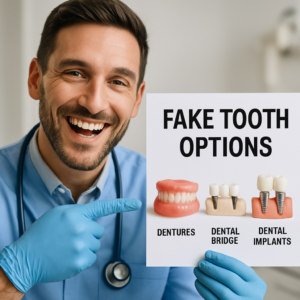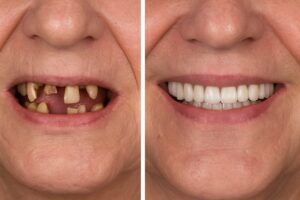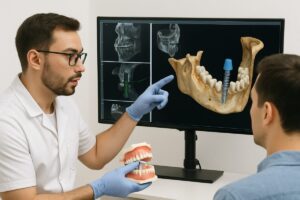Replacing a missing tooth matters. Learning about tooth replacement options helps you make choices that protect your health, your smile, and how you eat and speak. People lose teeth for many reasons — decay, injury, gum disease, or failed root canals. This post walks through common choices: removable dentures, bridges, single-tooth dental implants, implant-supported solutions, and some temporary or less-common picks, plus how to choose the right path for you.
Why replacing a missing tooth matters
A missing tooth affects more than looks. You may have trouble chewing or pronouncing words. Teeth next to the gap can shift, causing bite problems and more wear. Bone where the tooth was can shrink over time, making future replacements harder. Missing teeth can also lower confidence. Replacing a tooth helps restore function and prevents long-term problems.
Common tooth replacement options
Below are the main choices most patients consider when replacing one or more missing teeth. Each has benefits and trade-offs.
Removable dentures
Removable dentures include partials (replace some teeth) and full dentures (replace all teeth in an arch). They suit patients on a tighter budget or those who cannot have surgery. Pros: lower upfront cost and non-invasive fit. Cons: they can shift, need regular maintenance, limit chewing force, and may feel bulky. Adhesives and relines are sometimes needed.
Dental bridges
A traditional fixed bridge uses crowns on teeth next to the gap to support a false tooth. Bridges work when neighboring teeth are strong enough to be prepared. Pros: stable, looks natural, and the process is relatively quick. Cons: healthy adjacent teeth must be filed down, and bridges usually last 5–15 years before needing replacement.
Dental implants (single-tooth)
An implant has three parts: a titanium implant placed in bone, an abutment, and a crown on top. Implants act like a natural tooth root, preserving bone and feeling natural. Healing and integration usually take 3–6 months before the final crown is placed. Pros: long-lasting, strong chewing, and no damage to nearby teeth. Cons: higher upfront cost and requires sufficient bone and a healthy mouth.
Implant-supported bridges and dentures
Implants can support multiple teeth or full arches. Implant-supported bridges and overdentures offer more stability than removable dentures and reduce bone loss. Candidates need enough bone or may need grafting. These options cost more but improve chewing, comfort, and long-term results.
Temporary or less-common choices
Resin-bonded (Maryland) bridges, flippers (temporary acrylic teeth), or choosing no treatment are options in some cases. They’re less expensive or quick fixes but aren’t always durable. They may suit short-term needs or bridge the gap while planning longer treatment.
How to choose the right tooth replacement options
Consider oral health and bone level, how many and which teeth are missing, your budget and insurance, aesthetic goals, and how soon you need a solution. Discuss medical history, smoking, and diabetes with your dentist — these affect healing and implant success.
Costs, longevity, and recovery to expect
Costs vary widely: dentures are usually the lowest, bridges mid-range, and implants highest upfront. Longevity: dentures 5–10 years with upkeep, bridges 5–15 years, implants often 15+ years with good care. Recovery ranges from days for dentures/bridges to months for implant healing. All options need regular cleaning and dental follow-ups.
Questions to ask your dentist about tooth replacement options
Ask about all alternatives, timeline from start to finish, risks and complications, warranties or guarantees, expected maintenance, financing choices, and to see before-and-after photos of similar cases.
Looking for tooth replacement options?
If you’re weighing tooth replacement options, schedule a consultation to review your X-rays, medical history, and goals. Bring a list of medications and any dental insurance info. We can explain what fits your situation and help you make a plan. Contact our office to set up a personalized review.






